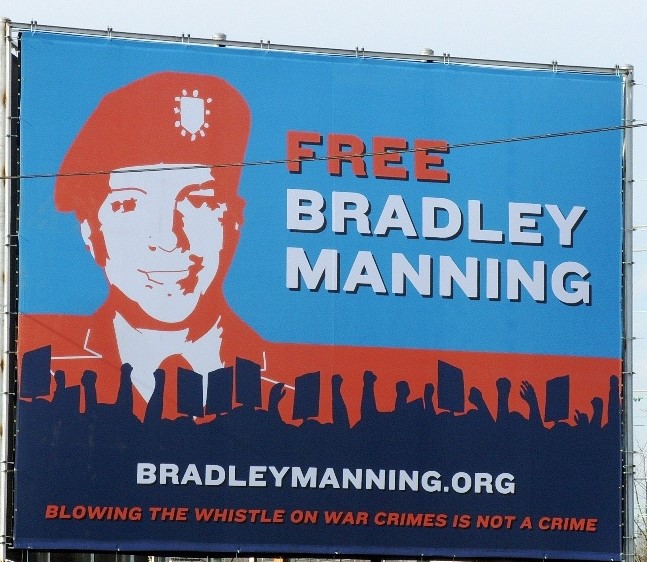By Josepha Laroche
Translation: Davina Durgana
Passage au crible n°51
 Source: Wikipedia
Source: Wikipedia
On December 16th, 2011 American soldier Bradley Manning appeared before the military court in Fort Meade, Maryland. He was suspected of having provided Wikileaks between November 2009 and May 2010 American army documents concerning the wars in Iraq and Afghanistan. He has also downloaded and transmitted 260,000 diplomatic cables from The State Department. These messages implicate many countries and also political and military figures. This mole is consequently accused of “collusion with the enemy”, “dissemination of military intelligence”, “Internet publication of intelligence knowingly made available to the enemy”, as well as “fraud and violation of military regulation”.
At 23 years of age, Bradley Manning, who has been in prison since July 2010, has extensive media coverage and enjoys the support among the American population, particularly among pacifists. His defense counsel immediately denounced the impartiality of the court. She demanded that the military prosecutor repose himself, but it has not been followed. The preliminary hearing will last five days. During this proceeding, it will not be determined whether the soldier is innocent or guilty, the juridical decision will only review the accusations against Manning. The investigators must simply say whether they will be pursuing a court martial before the trial can proceed. In any case, the trial will not take place before Spring 2012. In the meanwhile, the young culprit risks life imprisonment.
> Historical background
> Theoretical framework
> Analysis
> References
The beneficiary of these leakages and thus directly a party to this case, the Wiki Leaks website was created in December 2006. He has since divulged, in an anonymous manner, secured and unidentifiable, confidential information relating to political, social, economic and military domains. He aims to work towards a transparency that he would like to become global. According to its founder, Julian Assange, the resources received by his network are submitted to analysis, commentary, and enhancement “to the consideration of a global community of well-informed editors, proofreaders, and wiki-editors”; its long-term goal was to become “the most powerful body of information in the world”. This project, dependent on the expertise of Bradley Manning – Iraqi intelligence analyst – was immediately perceived by the American administration as relevant purely and simply to conspiracy.
Consider two lines of thought:
1. Questioning the sacred/profane dichotomy of the foundation of States
State power is constructed on the law of monopoles such as has been well established by Norbert Elias, or in other words, on the principle of exclusion. Yet, Bradley Manning and the Wiki Leaks website have frontally challenged the diplomatic monopoly by violating all prohibitions attached to the domain of States. Unsurprisingly, under these conditions, Heads of States and governments have made multiple declarations of reproach, hostility, and they have even decided to criminalize these acts.
2. The Violation of the Law of Secrecy
Dialogue and negotiation between states cannot flourish without a certain element of secrecy. In fact, diplomacy hides more than it shows. For centuries, correspondence between public authority figures and the instructions they have received from its highest representatives have been disseminated. Also from simple letters to more confidential messages, documents are systematically encrypted according to sophisticated codes. In these cases, this law is a technique and form of political action, which accords value to information, which would not have necessarily have remained simply accessible. This is above all the forbidden element that makes this information precious; and it is this prohibition that protects and sanctifies the State. In doing so, secrets must be analyzed as an essential attribute of State power, which confers to its holders a privilege and distinction that places them in exceptional positions. In other words, Bradley Manning violated and desecrated this historical arrangement by revealing to the whole world constitutive data of State secrets.
For over three centuries, global politics has been based on a system of sovereign States that do not recognize any authority as superior to States. Historically, these States have regulated their conflicts by war or by diplomacy. However, with the end of the Cold War, we have progressed towards a new distribution of power on a global scale and this inter-state hierarchal order finds itself hopelessly overwhelmed. States have thus ceased to be the dominant actors to the point of their systems of alliances, which have been characterized by today’s international order, which has been weakened. The Bradley Manning and Wiki Leaks case appears emblematic in this way because it demonstrates well that the world of States today is challenged by a polycentric and complex universe constituted of non-state actors. These “sovereignty-free actors” (Rosenau) are very diverse and autonomous and are often in conflict among each other. Essentially, these underlying forces demonstrate somewhat capable of benefitting from this redistribution of authority.
In this context, one can equally see that the globalization of information and the digital revolution has not only revolutionized the editorial and economic model of the global press, they have also profoundly subverted the State structure. In fact, the classic notions of territory, sovereignty, State authority and diplomatic monopoly presently cede power to the emergence of extra-state and transnational solidarity. From now on, State actors must deal with the whole, sometimes subversive, of non-state protagonists such as journalists, associations, informal groups of social networks, that is to say such skillful individuals such as Manning who, in the name of a certain concept of democracy, of cyber-citizenship, of liberty or even to test the digital prowess of a super geek to use the Internet to advance their cause and to attempt to preserve all of their rights with respect to States.
Elias Norbert, La Dynamique de l’Occident, trad., Paris, 1975.
http://www.guardian.co.uk/world/blog/2010/dec/03/julian-assange-wikileaks
http://www.wikileaks.ch/
http://www.cbsnews.com/8301-504803_162-20029950-10391709.html?tag=contentMain;contentBody
Rosenau James N., Turbulence in World Politics: a Theory of Change and Continuity, Princeton, Princeton University Press, 1990.
Simmel Georg, Secret et sociétés secrètes, [1908], trad., Paris, Circé, 1991.
Strayer Joseph, Les Origines médiévales de l’État moderne, trad., Paris, Payot, 1979.




